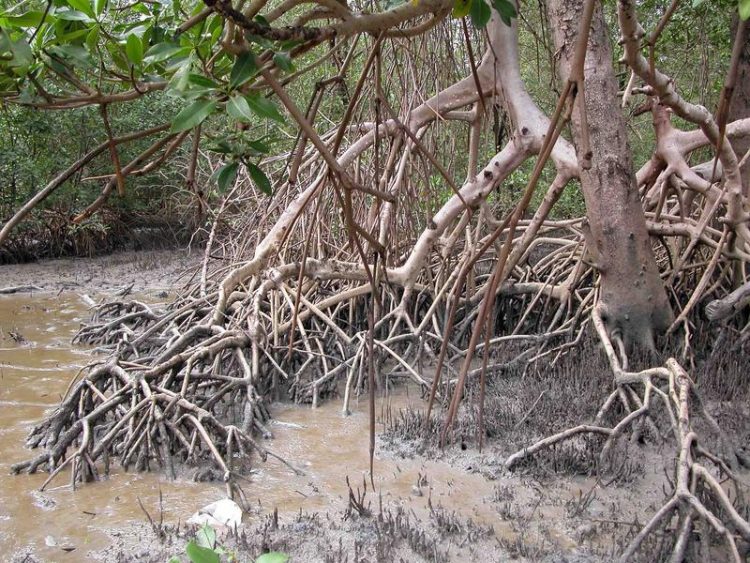Starting Shot for a Worldwide Mangrove Project

Mangroves in Northeastern Brazil Photo: Ulrich Saint-Paul, Leibniz Centre for Tropical Marine Research
The objective of the project is to understand how the services of mangrove forests for humans and the environment are related to the condition and change in their flora and fauna. Using state-of-the-art molecular biological methods, such as metabarcoding and metagenomics, the species composition and metabolism of animals and microorganisms in the sediment of the mangrove forests shall be determined.
Instead of classifying hundreds of animal species by their appearance, this technique allows conclusions to be drawn about the biodiversity of the region using DNA traces.
The researchers will also focus on the microorganisms – the bacteria, fungi and algae – which live in the muddy sediment of the mangroves. Metagenomic methods can also identify species that cannot be kept in culture.
The fallen leaves of the mangrove trees – they cast off up to three kilograms of leaves per square meter annually – supply nutrients to these microbes, which in turn drive complex ecosystem processes. Ultimately, numerous local and global ecosystem services of the mangroves depend on these processes in the sediment.
The project spans the entire globe and covers a wide variety of vegetation types of mangrove forests. Colombia, Brazil, South Africa, Oman, Singapore and Australia are just some of the stations that the researchers will be heading to.
“Perhaps the most challenging task will be to take sterile sediment samples in the mud of the mangroves in sultry heat or streaming monsoon rain, which are not microbially contaminated and produce adulterated results,” said Martin Zimmer, professor of Mangrove Ecology at the ZMT and director of the joint project.
The research bundles the expertise of four institutions of the Leibniz Association. In addition to the ZMT, the Leibniz Institute of Ecological Urban and Regional Development (IOER) in Dresden, the Leibniz Institute of Plant Biochemistry (IPB) in Halle, and the Leibniz Institute DSMZ – German Collection of Microorganisms and Cell Cultures in Braunschweig are involved.
“We also plan to incorporate socio-economic studies on the human use of mangroves. The scope of the research project spans the spectrum from microbial processes in the sediment to sustainable use by humans,” said Martin Zimmer. “Ultimately, our findings shall contribute to the worldwide protection of this valuable ecosystem.”
Along with coral reefs and tropical rainforests, mangroves are among the most productive ecosystems on earth. In the general perception they are still quite underestimated, although they fulfil immensely important tasks. Mangrove forests store enormous amounts of carbon and nitrogen in their sediments, thus contributing significantly to climate protection. They protect coasts from storm surges and erosion and with their food resources protect the coastal population from having to migrate. However, up to eight percent of the mangrove area worldwide is lost each year through clearing and deforestation.
Contact:
Prof. Dr. Martin Zimmer | Leader WG Mangrove Ecology
Leibniz Centre for Tropical Marine Research (ZMT)
Mail: martin.zimmer@leibniz-zmt.de | Tel: 0421 – 238 00-161
Dr. Susanne Eickhoff | Public Relations
Leibniz Centre for Tropical Marine Research (ZMT)
Mail: susanne.eickhoff@leibniz-zmt.de | Tel: 0421 – 238 00-37
About the Leibniz Centre for Tropical Marine Research
In research and education the Leibniz Centre for Tropical Marine Research (ZMT) in Bremen is dedicated to the better understanding of tropical coastal ecosystems. As an interdisciplinary Leibniz institute the ZMT conducts research on the structure and functioning of tropical coastal ecosystems and their reaction to natural changes and human interactions. It aims to provide a scientific basis for the protection and sustainable use of these ecosystems. The ZMT works in close cooperation with partners in the tropics, where it supports capacity building and the development of infrastructures in the area of sustainable coastal zone management. The ZMT is a member of the Leibniz Association.
Media Contact
More Information:
http://www.leibniz-zmt.deAll latest news from the category: Earth Sciences
Earth Sciences (also referred to as Geosciences), which deals with basic issues surrounding our planet, plays a vital role in the area of energy and raw materials supply.
Earth Sciences comprises subjects such as geology, geography, geological informatics, paleontology, mineralogy, petrography, crystallography, geophysics, geodesy, glaciology, cartography, photogrammetry, meteorology and seismology, early-warning systems, earthquake research and polar research.
Newest articles

Zap Energy achieves 37-million-degree temperatures in a compact device
New publication reports record electron temperatures for a small-scale, sheared-flow-stabilized Z-pinch fusion device. In the nine decades since humans first produced fusion reactions, only a few fusion technologies have demonstrated…

Innovative microscopy demystifies metabolism of Alzheimer’s
Researchers at UC San Diego have deployed state-of-the art imaging techniques to discover the metabolism driving Alzheimer’s disease; results suggest new treatment strategies. Alzheimer’s disease causes significant problems with memory,…

A cause of immunodeficiency identified
After stroke and heart attack: Every year, between 250,000 and 300,000 people in Germany suffer from a stroke or heart attack. These patients suffer immune disturbances and are very frequently…





















